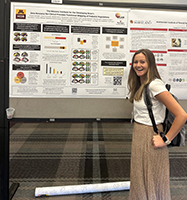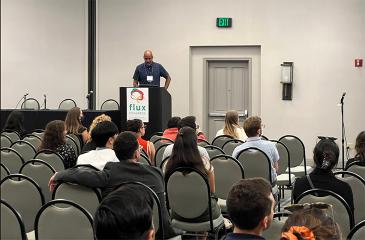Expanding Understanding of Developmental Cognitive Neuroscience at the 11th Annual Flux Congress
Many MIDB members and students attended last month's Flux Congress in Santa Rosa, Calif. The annual event is held by the Flux Society, which aims to advance the understanding of human brain development by serving as a forum for professional and student scientists, physicians, and educators. MIDB Co-Director Damien Fair, PA-C, PhD, serves as Flux Society's president.
Kristina Hufnagle was excited to return to this year's event to reconnect with people she met met at last year's conference and learn about recent advances in the field and where gaps still remain.

"I really enjoyed the roundtable discussion on the intersection of cognitive neuroscience research and the translational policy applications of our work," Hufnagle said. "It's easy for folks to lean into the granular level of research, and understanding the broader implications of our research reminded me why I do the work that I do: to better understand and improve treatment for conditions that affect kids, adolescents and families every day."
As a research assistant in the Developmental Cognition and Neuroimaging Lab, Hufnagle is working on a study that uses fMRI techniques to learn more about pediatric neurodevelopmental disorders such as autism spectrum disorder (ASD) and attention deficit hyperactivity disorder (ADHD). She presented two posters at Flux: Evaluating Resting-State fMRI Methods Using Simulated Timeseries Data, and A New and Public Resource to Advance Understanding of and ADHD and ASD.
"Flux was a great opportunity for me to spread the word about the pediatric neurodevelopment data resource that our team has been leading during the past two years. This first-of-its-kind dataset will become publicly available to other researchers in 2024, and I am passionate about showcasing that it's possible to collect highly-sampled data in kids with and without ADHD and ASD," Hufnagle said.
Hufnagle says her key takeaway from the conference is that, "there is still so much to be learned, and we can accelerate these discoveries by listening to and collaborating with our colleagues. I learned a lot by discussing methods with another university's research coordinator that also works with pediatric populations that have historically been challenging to get low-motion MRI data from."
Also at the Flux Congress, University of Minnesota faculty Brendon Tervo-Clemmens, PhD, served as the Alexander Valley Chair for the Huttenlocher Lecture, and the Flash Talk "Development of Functional Systems In 0-2 Year-Olds" was presented by MIDB members and U faculty Eric Feczko, PhD, Trevor Day, Oscar Miranda-Dominguez, PhD, MS, Lucille Moore, Fair, and Jed Elison, PhD.



